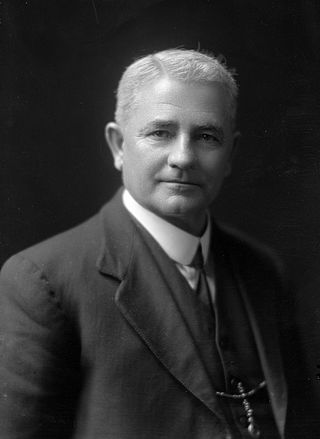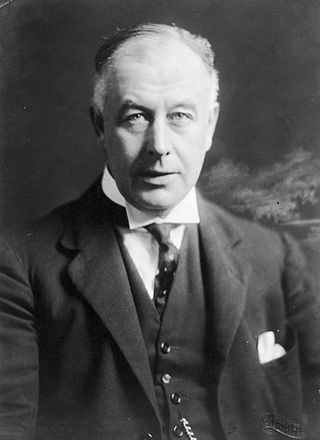
Sir Robert Laird Borden was a Canadian lawyer and politician who was the eighth prime minister of Canada from 1911 to 1920. He is best known for his leadership of Canada during World War I.

Andrew Fisher was an Australian politician who served as the fifth prime minister of Australia, from 1908 to 1909, 1910 to 1913, and 1914 to 1915, holding office as the leader of the Australian Labor Party (ALP). In 1910 Fisher led Labor to its first federal election victory and first majority government.
The New Zealand Labour Party, or simply Labour, is a centre-left political party in New Zealand. The party's platform programme describes its founding principle as democratic socialism, while observers describe Labour as social-democratic and pragmatic in practice. The party participates in the international Progressive Alliance. It is one of two major political parties in New Zealand, alongside its traditional rival, the National Party.

William Ferguson Massey, commonly known as Bill Massey, was a politician who served as the 19th prime minister of New Zealand from May 1912 to May 1925. He was the founding leader of the Reform Party, New Zealand's second organised political party, from 1909 until his death.
The Social Democratic Party of New Zealand was an early centre-left to left-wing political party. It existed only a short time before being amalgamated into the new Labour Party. During its period of existence, the party held two seats in Parliament.
The United Labour Party (ULP) of New Zealand was an early centre-left to left-wing political party. Founded in 1912, it represented the more moderate wing of the labour movement. In 1916 it joined with other political groups to establish the modern Labour Party.
The Reform Party, formally the New Zealand Political Reform League, was New Zealand's second major political party, having been founded as a conservative response to the original Liberal Party. It was in government between 1912 and 1928, and later formed a coalition with the United Party, and then merged with United to form the modern National Party.
The Waihi miners' strike was a major strike action in 1912 by gold miners in the New Zealand town of Waihi. It is widely regarded as the most significant industrial action in the history of New Zealand's labour movement. It resulted in one striker being killed, one of only two deaths in industrial actions in New Zealand.

Sir Joseph George Ward, 1st Baronet, was a New Zealand politician who served as the 17th prime minister of New Zealand from 1906 to 1912 and from 1928 to 1930. He was a dominant figure in the Liberal and United ministries of the late 19th and early 20th centuries.

Joseph Gordon Coates served as the 21st prime minister of New Zealand from 1925 to 1928. He was the third successive Reform prime minister since 1912.

Henry Edmund Holland was an Australian-born newspaper owner, politician and unionist who relocated to New Zealand. He was the second leader of the New Zealand Labour Party.

Alexander Lawrence Herdman was a New Zealand politician. He served as Attorney-General, Minister of Justice, and Minister of Police. He is known for his reforms of the civil service and for his hard line on law and order.
The following lists events that happened during 1912 in New Zealand.

The Liberal Government of New Zealand was the first responsible government in New Zealand politics organised along party lines. The government formed following the founding of the Liberal Party and took office on 24 January 1891, and governed New Zealand for over 21 years until 10 July 1912. To date, it is the longest-serving government in New Zealand's history. The government was also historically notable for enacting significant social and economic changes, such as the Old Age Pensions Act and women's suffrage. One historian described the policies of the government as "a revolution in the relationship between the government and the people".

Hubert Thomas "Tim" Armstrong was a New Zealand politician in the Labour Party.

William Edward Parry was a New Zealand Minister and trade unionist.
The history of the Australian Labor Party has its origins in the Labour parties founded in the 1890s in the Australian colonies prior to federation. Labor tradition ascribes the founding of Queensland Labour to a meeting of striking pastoral workers under a ghost gum tree in Barcaldine, Queensland in 1891. The Balmain, New South Wales branch of the party claims to be the oldest in Australia. Labour as a parliamentary party dates from 1891 in New South Wales and South Australia, 1893 in Queensland, and later in the other colonies.
The Wellington North by-election of 1918 was a by-election held in the Wellington North electorate during the 19th New Zealand Parliament, on 12 February 1918. It was caused by the resignation of incumbent MP Alexander Herdman of the Reform Party, who was appointed as a judge of the Supreme Court, and was won by John Luke with a majority of 420.

Conservatism in New Zealand, though related to its counterparts in other Western countries, developed uniquely over time. Advocates followed a political ideology that emphasised the preservation of traditional European beliefs, institutions and practices.

In April 1912 and July 1913, two "unity conferences" were held to discuss and determine the future of organised labour in New Zealand. The events mainly centred around the debate over whether industrial action or political activity should be the means of achieving the aims of workers and additionally to unite the "moderate" and "militant" factions within the labour movement. Whilst neither conference fully unified the labour movement, it laid a framework of co-operation that would later assist during the creation of the current New Zealand Labour Party in 1916.















